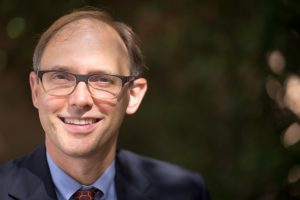 As Dean Roger Hartley enters his seventh year at The University of Baltimore, we asked him to reflect on his time as dean of the College of Public Affairs.
As Dean Roger Hartley enters his seventh year at The University of Baltimore, we asked him to reflect on his time as dean of the College of Public Affairs.
1) In what ways have the college and programs grown during your time as dean?
In my six years as dean, the college has undergone considerable innovation due to a terrific team of faculty, staff and supportive alums. We have grown to over 15 degree programs (nine masters and six undergraduate) and multiple degree and non-degree certificates. These are in such fields as criminal justice and cyber forensics, health, human services, policy, politics and international affairs, and public administration. With this has come changes in how we reach students with a mix of online programs, in person, and programs offered at The Universities at Shady Grove.
Another advancement has been in engagement work and equity and inclusion. The college received national recognition for social equity from the Network of Schools of Public Policy, Affairs, and Administration (NASPAA) in 2018 and additional awards for our work in community development in Baltimore.
In 2017, we added a Center for Drug Policy and Prevention that includes the Washington/Baltimore High Intensity Drug Trafficking Area (HIDTA). This has expanded our work in drug policy and put us on the cutting edge of this area of public service. The Schaefer Center for Public Policy has created new certificate programs through partnerships with the Maryland Commission on Civil Rights and Enterprise Community Partners. Among other areas of engagement are the Second Chance College Program, which educates incarcerated men in Jessup Correctional Institute, and the criminal justice-led Roper Victim Assistance Academy of Maryland, which leads in trauma-informed practices.
I have been privileged to be able to work with a dynamic, innovative group of leaders who make public service education create impact on the people of our state. I am so lucky.
2) Why are public servants so important?
I could go on for hours about this, but the role of government and nonprofit leaders changes lives. It improves lives. Public service is the highest of callings for a career, and this college is wholly devoted to the vocation of bringing people together to assist people, businesses and other institutions reach their highest. When I think of our students, many first generation, who want to improve lives, it makes me so proud.
3) Why do you love working in higher education?
I was a first-generation college graduate. Higher education changed my life forever and it has given me an opportunity to help others in my own way. Higher education, like public service, is a career for a life well lived.
Follow Dean Hartley on Twitter @ProfHartley.
